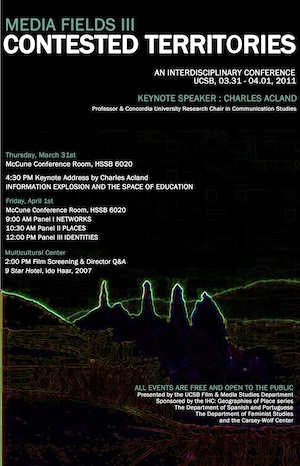Media Fields 2011
 Thursday, July 27, 2017 at 7:30PM
Thursday, July 27, 2017 at 7:30PM Contested Territories
All events are free and open to the public.
View a UCSB campus map showing conference venues [PDF]
Thursday, March 31, 2011
McCune Conference Room (HSSB 6020)
4:30 PM
Keynote Speaker:
Charles Acland, Professor and Concordia University Research Chair in Communication Studies
“Information Explosion and the Space of Education”
As the US begins a new “Sputnik moment,” this research revisits the years leading up to the original crisis of the late 1950s and the national educational policies that developed in response. Those post-WWII years saw a significant reorientation of pedagogical practice that involved new forms of instructional media, with a major consequence of dramatically changing educational space. This period laid the ground for the ongoing “technologizing of the classroom,” and is responsible for establishing core notions about the relationship between new media and the information society, a relationship we continue to navigate today.
Charles Acland’s books include Screen Traffic: Movies, Multiplexes, and Global Culture and the edited collection Residual Media. A co-edited volume on non-theatrical film, Useful Cinema, will appear this year, and his newest book on the history of popular ideas about media manipulation, Swift Viewing in a Cluttered Age, is forthcoming in 2012. Acland is editor of the Canadian Journal of Film Studies.
Friday, April 1, 2011
McCune Conference Room (HSSB 6020)
9 AM - 10:15 AM
Panel 1 | Contested Territories: Networks
Chair: Rahul Mukherjee, UCSB
Jon Cohn, UCLA, “‘Digg Has Broken an Axle’: The Fractures of Media Citizenship on Social News Sites”
Nicole Starosielski, Miami University, “Island/Network: Contested Topographies of Fiji's Media Environment”
Rotem Rozental, Cohn Institute for History and Philosophy of Science and Ideas, “Social Territory: Rethinking Social Interaction through the Image”
10:30 AM - 11:45 AM
Panel 2 | Contested Territories: Places
Chair: Lindsay Palmer, UCSB
Desiree D’Alessandro, UCSB, “Deleuze and Third Cinema in Ousmane Sembène's Ceddo”
Regina Longo, UCSB, “Fragmentary Archives and Sites of Reconstruction: Nodal and Interstitial Migrations of Marshall Plan Films”
Michael Albright, UCSB, “Contested Territories of Camera Operation”
12:00 PM - 1:15 PM
Panel 3 | Contested Territories: Identities
Chair: Sarah Harris, UCSB
Xima Avalos, USC, “There Goes the Neighborhood: Gran Torino, La Mission, Immigration, Gentrification, and Masculinity”
Ajay Gehlawat, Sonoma State University, “Whose Bollywood?”
Liliana Gallegos, UCSB, “Tijuana the Aleph”
Multicultural Center
2 PM
Film Screening and Director Q&A:
9 Star Hotel (2007), directed by Ido Haar
Ido Haar is an Israeli filmmaker, working extensively for Israeli TV focusing on directing, shooting and editing documentaries on social, political, and cultural subjects. His films 9 Star Hotel and Melting Siberia enjoyed worldwide success.
About 9 Star Hotel
Just as Mexicans cross U.S. borders illegally to find work as day laborers, thousands of Palestinians do likewise, into neighboring Israel, seeking jobs in construction. For 9 Star Hotel, Israeli filmmaker Ido Haar gained the trust of a group of nomadic young men whom he observed fleeing from police, risking their lives to cross highways at night, sleeping in makeshift hovels--a dramatic contrast to the luxury housing they build by day. “We think backwards--we never think forward. We are like scavengers, like those who harvest olives after the locust,” one of his subjects confesses with lyrical simplicity. This is a devastating cinema verite portrait of young men caught in an economic and political maelstrom not of their own making – their dreams subsumed by the hard reality of day-to-day survival. Winner of the Best Documentary Award, Jerusalem International Film Festival, 2006. A surprise hit in Israel.

Reader Comments